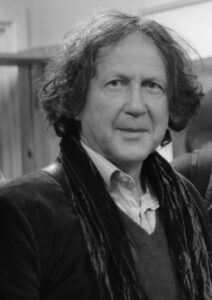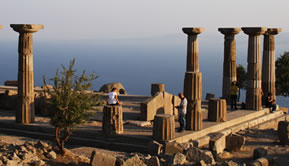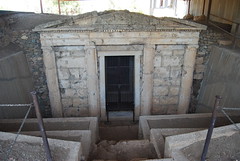A Scholar Without Limits: An Appreciation of Richard Seaford
 (© Laura Casimir)
(© Laura Casimir)
How did Greek philosophy and religion influence Greek tragedy? How is the world of Homeric epic different from that of classical tragedy, and why did that difference come about? And what could this difference tell us about the society in which the tragedies were written? Or, indeed, our own?
The death in December 2023 of Richard Seaford, Professor Emeritus of Classics at the University of Exeter, has robbed us of one of the most original thinkers to confront these questions over the last half-century.
Seaford, whom I was privileged to know as one of my doctoral supervisors, was an exemplar of the dictum of Heraclitus that ‘Men who love wisdom must have knowledge of many things indeed’. He was a polymath of the old school, able to move with facility between discussions on the trickiest points of textual criticism and Greek manuscripts, to Presocratic philosophy, numismatics, obscure cultic practices, music, economic and political theory, the New Testament and even – later in his career – classical Indian religious texts. His insights came from applying this breadth of knowledge to Greek tragedy and epic. His insistence on seeing ancient Greek literature in its historical, religious, political and economic context challenged the orthodoxy of an earlier generation of post-war scholars who preferred to interpret texts in a detached way as self-contained literary artefacts.
Some of Seaford’s most pivotal work focused on the revolutionary change that the emergence of coined money wrought on Greek culture. Coinage was invented in Lydia, Asia Minor, at the end of the seventh century BC, and its use spread rapidly through the Greek city-states in the following century. Fresh witnesses as they were to its sudden rise, the Greeks were able to articulate how strange and disturbing the phenomenon could seem.
In Aristophanes’ comedy Wealth (Plutus), which Seaford suggested was almost certainly the first surviving text on economics, the power of money displaces that of the gods. Money can do anything. All men clamour for it, and sacrifices to the gods depend on it. Through money all things are achieved, and (contrary to St Paul’s dictum) it is the sole cause of both good and evil. Aristophanes’ characters observe that unlike other things – cakes, battles, sex, honours, figs, ambition, lentil soup – the desire for money is unsatiable: ‘If a man has 13 talents, he has all the greater ardour to possess 16; if that wish is achieved, he will want 40 or will complain that he knows not how to make both ends meet.’
The Greeks observed that money dissolved old limits. Not only did it offer boundless power and enfeeble personal restraint, but it could be carried, accumulated and concealed on a scale far beyond that of the Homeric stores of wealth, for example cattle or tripods. Through lending or complex transactions, money could also be used to generate more money – an idea which Aristotle found troubling and unnatural.
Seaford pointed out that this unease about the rise of money is manifest in various Greek myths, for example Midas turning everything to gold with his touch (his touch being a metaphor for the minting of coins) or the less well-known Erysichthon of Thessaly, who cut down a sacred grove of Demeter to build a banqueting hall, and was punished by Demeter and Dionysus with insatiability; he would sell his daughter to buy food, but she would return to him and the process would be repeated. In the end, he ate himself.
One of Seaford’s most consequential arguments was that the spread of coined money and the ideas it brought in its train underpinned the origins of Greek philosophy in the sixth century BC. The first thinkers to speculate at this time about the nature of the cosmos as an impersonal system were in Miletus, the commercial heart of Ionia, one of the first places to become a full monetary economy. For Seaford, the qualities of money – a substance that had a near-abstract and boundless nature, but which also pervaded all social and material endeavours – were projected by these early philosophers into their accounts of cosmos. The divine element in the world was not any anthropomorphic Olympian deity, but rather a boundless substance which underlay and had power over all material things, and from which all other elements could be derived. Thales of Miletus claimed this fundamental and all-pervasive element was water. His younger Milesian colleagues, Anaximander and Anaximenes, posited that it was something called ‘to apeiron’ (a ‘boundless thing’) or air respectively. Heraclitus famously considered it to be fire, and, as Seaford argued, his fragments clearly showed the striking connection between the notions of money and early philosophy: ‘All things are an exchange for fire, and fire for all things, as goods for gold and gold for goods’ (Heraclitus fragment, DK22 B 90).
These notions influenced more than philosophy. Seaford observed that the genre of tragedy arose in Athens soon after the introduction of coinage, and he was the leading exponent of the idea that coined money was the great watershed which divided the literary world of Homer from that of tragedy. Money was unknown in Homeric epic, and social relationships were governed by pre-monetary customs of reciprocity, gift-giving, obligations to kinship groups, and ritual. In the tragic sphere, money has corroded these old connections.
Athenian tragedy, he argued, was especially concerned with tyranny – the word ‘tyrant’, he reminds us, appears far more frequently in the tragic corpus than ‘hero’. Tyranny became possible in the developing Greek city-states thanks to the capacity of ambitious individuals to accumulate excessive money, and hence excessive power. In tragedy one saw horrific behaviour that was quite unknown in Homer. Extreme wealth made tyrants, such as Pentheus in Euripides’ Bacchae or Creon in Sophocles’ Antigone, trample down the old ties of reciprocity and social obligation. The frequent conclusion of this was a paranoid solipsism that led the tyrants to destroy their closest kin – family, children, spouses – by murder or exile, before destroying themselves. For Seaford, one of the most significant themes of tragedy was the ruination of a tyrannical house and the transfer of its wealth, military, and religious prerogatives – under the supervision of Dionysus – to the democratic polis: a paradigm which, like Dionysus himself, is almost entirely absent from Homer.
Another area of Seaford’s work connected to this idea was an emphasis on the need to pay attention to the presence of ritual and cult in Greek tragedy. Dionysus and his Bacchic mystery cult may be an obvious presence in Euripides’ Bacchae, but allusions to ritual elsewhere, he argued, were often neglected by modern scholars. The conflict within the tyrant’s family and the collapse of limits is often marked by the perversion of ritual. Clytemnestra’s desire to bathe and robe Agamemnon on his return from Troy in Aeschylus’ Agamemnon was a grim inversion of Greek funerary custom where a wife bathes and shrouds her dead husband. Wedding ritual is often interrupted and mixed up with funeral rites, as with Antigone’s tomb being mixed up with her bridal chamber, or elements of her lament taking on the aspect of a marriage hymn. Seaford stressed that one had to be alive to these allusions not only because they would have had particular emotional resonance with an ancient Greek audience, but also because they were a further sign of the breakdown of limits in the tragic world.
Seaford’s own scholarship was far from bounded by the conventional limits of the classical discipline. He published a deeply-researched work arguing that the rise of monetisation in ancient India was responsible for developments in Indian philosophy which mirrored those in sixth-century BC Greece. He analysed allusions to mystery cult in the Epistles of St Paul and the Acts of the Apostles. He wrote especially entertainingly about the debt that Richard Wagner’s operas owed to Aeschylus. His prolific creativity remained to the end of his life, and he completed his last work – Aggregation and Antithesis in Ancient Greece, to be published in 2025 – just a few weeks before his death.
Above all, Seaford maintained a deep conviction in the value of the study of the Hellenic world, which, as a student, made every conversation with him inspiring and exhilarating. In an article he wrote for the Times Literary Supplement in 2009 in response to the world financial crisis, he drew together many strands of his work and showed their application to the contemporary world: ‘…the Greek culture of the limit provides a place that allows us to see the oddness, the historical contingency of the lethally limiting unlimitedness in our economy, social practices and theory. Hellenism is one of a number of precious resources – a way of being, understanding and perceiving – that can help to liberate us from the homogenised sensibility of our hyper-monetised, atomised and self-destructive culture of the unlimited.’ Fifteen years later, his words continue to ring true.
The author would like to thank Professor Matthew Wright of Exeter for reviewing this article.
FURTHER READING
- SEAFORD, Reciprocity and Ritual: Homer and Tragedy in the Developing City-state, Clarendon Press, 1994
- SEAFORD, Money and the early Greek mind, Cambridge University Press, 2004
- SEAFORD, Cosmology and the Polis, Cambridge University Press, 2012
- SEAFORD, (ed. Robert Bostock), Tragedy, Ritual, and Money in Ancient Greece: Selected Essays, Cambridge University Press, 2018
- SEAFORD, The Origins of Philosophy in Ancient Greece and India: A Historical Comparison, Cambridge University Press, 2020









